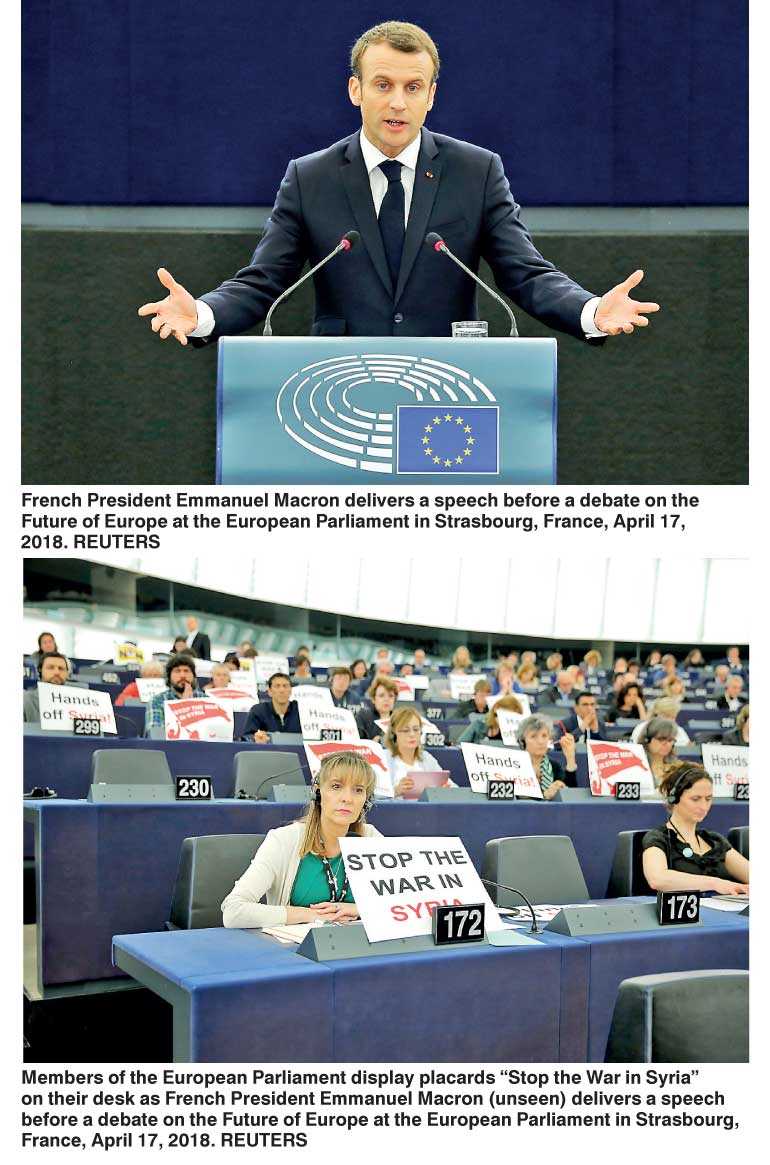Tuesday Feb 17, 2026
Tuesday Feb 17, 2026
Wednesday, 18 April 2018 00:59 - - {{hitsCtrl.values.hits}}
Strasbourg (AFP): French President Emmanuel Macron warned Europe on Tuesday against the temptations of “authoritarianism” both around the world and inside the European Union itself.
In his first speech to the European Parliament in Strasbourg, Macron said there was a “sort of European civil war” and called on the bloc to defend democracy.
The young French leader’s call to arms comes after eurosceptic populists won elections in Hungary and Italy, and as Brussels confronts Poland’s right-wing government over the rule of law.
“I don’t want to belong to a generation of sleepwalkers, I don’t want to belong to a generation that’s forgotten its own past,” the 40-year-old president said in a speech outlining his vision for the future of the EU.
“I want to belong to a generation that will defend European sovereignty because we fought to obtain it. And I will not give in to any kind of fixation on authoritarianism,” he added.
Macron’s election last year, defeating the far-right candidate Marine Le Pen, and his ardent pro-Europeanism have made him the poster boy for those aiming for a revived post-Brexit EU to battle the challenges of populism.

Macron said he was concerned by the growing sense of “doubt” in several European countries in the wake of the shock 2016 Brexit vote, which he said was creating divisions in the EU.
“There seems to be a sort of European civil war. There is a fascination with the illiberal and it’s growing all the time,” Macron told MEPs in the eastern French city.
His speech comes just days after Hungary’s right-wing Prime Minister Viktor Orban won a crushing re-election victory.
Orban regularly clashes with Brussels but is a “hero” for US President Donald Trump’s former strategist Steve Bannon.
Macron’s speech was welcomed by European Commission President Jean-Claude Juncker, who told parliament afterwards: “The true France is back.”
But Macron has struggled to win support across Europe for all his proposals. His speech to MEPs is part of a charm offensive ahead of European Parliament elections in May 2019, the first after Britain’s scheduled departure from the EU.
Later this week Macron will travel to Berlin for talks with German Chancellor Angela Merkel to try to boost flagging support for his plans for the future of the eurozone.
Merkel’s conservative CDU party pushed back on Monday against plans for deeper eurozone integration, including a separate eurozone budget and the expansion of the EU’s bailout fund.
Any reforms have to be “in the European and in the German interest,” CDU secretary-general AnnegretKramp-Karrenbauer told reporters.
Macron separately proposed on Tuesday to create a European fund for communities that take in refugees in a bid to tackle one of the most politically toxic issues facing the EU.
“I propose creating a European program that directly financially supports local communities that welcome and integrate refugees,” Macron said.
EU leaders are set to adopt preliminary Macron-backed plans for eurozone reforms and for an overhaul of its troubled asylum system in June, but there is still a lot of work to do.
Fighting to push through reforms at home in the face of mass rail strikes, Macron also faced difficulties in the European Parliament, where his domestic En Marche party is not affiliated to any political group.
Merkel is due to address the European Parliament in November, officials said on Monday.
She made a joint speech with then-French president Francois Hollande in Strasbourg in 2015 in which they urged unity in the face of the migrant crisis.
France moves to strip Assad of his Legion d’Honneur
PARIS (AFP): The French government plans to strip Syrian President Bashar as-Assad of his Legion d’Honneur, France’s most prestigious award, days after participating in airstrikes against suspected chemical weapons sites in Syria.
“The Elysee confirms that a disciplinary procedure for withdrawing the Legion d’Honneur (Legion of Honour) is underway,” Macron’s office said late Monday.
Assad was decorated with the Legion’s highest rank of Grand Croix (Great Cross) by former president Jacques Chirac in 2001, shortly after taking power following the death of his father Hafez al-Assad.
Only a French president, who by tradition is the top-ranking Legion member, can decide to withdraw the distinction from a foreigner.
About 3,000 people are granted the distinction each year, including 400 foreigners recognised for their “services rendered to France” or for defending human rights, press freedom or other causes, according to the Legion’s web site.
Assad has been accused of a series of chemical attacks on his own people during the brutal civil war which has torn Syria apart since 2011.
He has become a pariah for Western powers while maintaining the support of Russian President Vladimir Putin, whose military intervention in the conflict gave Assad the upper hand against rebel opposition groups.